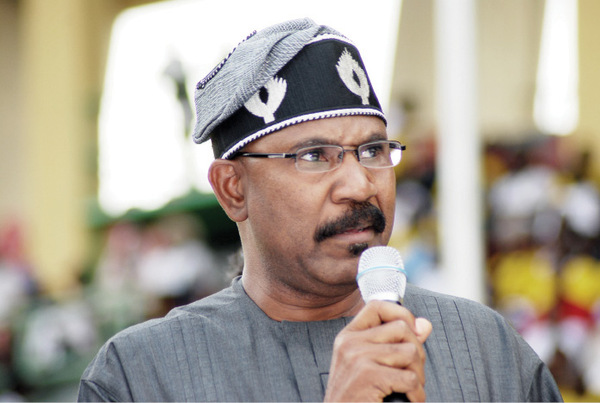
 …Says FG may suspend NIN registration
…Says FG may suspend NIN registration
…To review safety protocols, schools resumption date
…Says Nigeria’s hospital capacity strained
…Declares no state’s immune, set to roll out rapid test kits in Abuja
…NIMC staff threaten to down tools again, issue 21days ultimatum
By Sola Ogundipe, Omeiza Ajayi, Emmanuel Elebeke & Gabriel Olawale
The Federal Government, yesterday, expressed concern over the large crowd of Nigerians besieging offices of National Identity Management Commission, NIMC, nationwide for National Identification Number, NIN, enrollment, saying it may suspend the process to prevent the spread of COVID-19.
The Minister of State for Health, Dr Olorunnimbe Mamora, who disclosed this on on a Channels Television breakfast programme, Sunrise, urged the National Identity Management Commission, NIMC, to go back to the drawing board and re-order the enrollment process to avoid large crowds at its centres nationwide.
Mamora spoke on a day government also announced its decision to review the COVID-19 safety protocols as well as the January 18 resumption date for schools in the light of Nigeria’s grim epidemiological situation with regards to the pandemic.
Mamora, who is a member of the Presidential Task Force on COVID-19, said the government had a duty to ensure Nigerians were protected at all times.
He said: “I don’t feel good, looking at the picture where people are gathered in multitude. It is like a super-spreader event which we don’t like. But I’m also aware that the relevant ministry, which is communications and digital economy, is looking at this.
“My understanding is that the whole process may be suspended to reorder it in terms of management of the crowd because it was never intended that it would become a rowdy process like that.
“We have a duty as government to ensure that people are protected; we also have a duty to ensure people comply within the limit of what is good for the society at large.”
Workers of the NIMC had embarked on strike last Thursday over exposure to COVID-19 risks, lack of personal protective equipment and poor funding. The workers, however, called off the industrial action some 48 hours later.
The Federal government through the Nigerian Communications Commission had ordered telecommunications companies to deactivate telephone lines of subscribers who failed to link their phones to their National Identity Numbers.
It also said all telcos subscribers with NIN had January 19 deadline to link their NIN with their SIM cards, while subscribers without NIN have until February 9 to do so.
The poor also die of COVID-19
Mamora, who expressed worry over the attitude of Nigerians towards the COVID-19 safety guidelines, said it was not true that only the wealthy were dying as a result of the infection.
“I am worried about the attitude of our people generally in terms of non-compliance, particularly with respect to non-pharmaceutical interventions. If you go out there, you still see a lot of people who are not bothered in terms of their attitude of not wanting to use the face mask or when it is used, it is inappropriately worn.
“You still see people in large gatherings hosting parties as if nothing is happening. A few states are putting in place enforcement measures. However, the rising figures daily are of huge concern and the deaths that we are recording on daily basis are also of concern.
“Some people seem to think it is the big people that are dying but that is not the case. Yes, it is the big people that you report and the tendency is that it is the death of the big people that will attract attention more. But he who feels it knows it; people are dying,’’ the minister lamented.
Similarly, the Federal Government yesterday announced its decision to review the COVID-19 safety protocols as well as the January 18 resumption date for schools in the light of Nigeria’s grim epidemiological situation with regards to the pandemic.
It again lamented that the nation’s health care infrastructure was greatly strained as the country was now at a critical level in its hospital capacity.
Government also explained its inability to produce COVID-19 vaccines in the country, attributing it to several years of inadequate investments in the health sector.
While it declared that no state was immuned to the virus, government also announced its decision to roll out Rapid Diagnostic Test Kits RDTKs in five tertiary health institutions in Abuja next Monday.
The government had last year, faulted Kogi State government’s insistence on using test kits rather than deploying the more expensive PCR test.
Schools resumption
Speaking at yesterday’s briefing of the Presidential Task Force, PTF, on COVID-19, the Minister of Education, Malam Adamu Adamu, said the earlier resumption date of January 18 was not cast in stone.
“When we decided on that date, it was just a target towards which we were working. And, of course, we are giving it a review in view of what is happening in the country.
“Today (yesterday) at the PTF meeting, we looked at the rising figures and decided that probably we should take another look at the date.
“The January 18 resumption date is not sacrosanct as it is subject to constant review in view of prevailing epidemiological circumstances. We are reviewing it. In view of the rising cases, today (yesterday) we have considered it at the meeting of the PTF and tomorrow (today), the ministry is going to take it up. So, most likely it is going to be reviewed,” Adamu stated.
Protocol review
National Coordinator of the Task Force, Dr Sani Aliyu, noted that the PTF would soon review the safety protocols to target night crawlers who violate the current safety precautions.
“Our beds are fast filling up in our treatment centres and you don’t want to be in a situation where decision is taken as to whether you should be put on oxygen or a ventilator.
“The PTF is currently in the process of reviewing our protocols. We have had discussions with state governors, including a review of curfew hours, particularly with the aim of addressing the issue of night life and entertainment which is also driving the current numbers and once this review is completed, an announcement will follow with regards to the curfew,” he stated.
Director General of the Nigeria Centre for Disease Control NCDC, Dr Chikwe Iheakwazu, on his part, lamented that hospital capacity in several towns had reached a critical level.
He said: “We are reaching a critical level with our hospital capacity in many towns in Nigeria and we must begin to protect our most vulnerable as we get deeper into this phase of the outbreak. Remember this virus is not tired and it is taking advantage of our tiredness and fatigue.”
Minister of State, Health, Dr Olorunnimbe Mamora, who also spoke after speaking earlier on Channels Television, warned against overcrowding at the enrollment centres of the National Identity Management Commission NIMC, saying the situation could be avoided if prospective enrollees would adhere to the timelines released by the Commission.
He said the result of the test of participants of the National Youth Service Corps NYSC scheme indicated that no part of the country was free of the virus, saying the PTF reached the conclusion knowing that corps members were mobilized from all over the country.
“The result from the tests conducted on prospective NYSC members has incontrovertibly confirmed that no part of the country is free of COVID-19 disease. We safely and comfortably draw this conclusion because corps members are mobilized from all the states of the country for each of the orientation camps.
READ ALSO: Nigerians kick against NIMC over fee attached to National ID card
“With the increased number of confirmed cases, the number of active cases has increased. As of today, we have 18,699 active cases on treatment both in facility and in the community using the treatment protocols. Many of the active cases may require care in one of the treatment or isolation centres thus imposing enormous burden on our facilities.
“The report that many of those who died, reported late for treatment at the approved centres because they were referred late from private facilities is alarming. We, therefore, once again seize this opportunity to urge health care practitioners to promptly send all suspected cases for testing and when positive, refer them to isolation centres for treatment.
‘’Attempting to treat suspected or confirmed cases not only exposes the health workers in such a facility to risk of infection but also denies the patient early access to effective treatment in an approved treatment centre.’’
Secretary to the Government of the Federation, SGF, and Chairman of the PTF, Mr Boss Mustapha, noted that the current wave of infections was swift and virulent “and we do not know how long it will last.
“Besides, the facilities available for the treatment of critical cases remain very limited and we do not wish to be overwhelmed. Your best bet, therefore, is to avoid infections completely.’’
Mustapha said in order to scale up testing, “the pilot exercise on the use of Rapid Diagnostic Test-Kits RDTs will be rolled out in five tertiary health institutions in Abuja from Monday next week.
“Last week, Nigeria recorded over 9,000 cases. Realistically, if we estimate the numbers missed, we would be in a much higher region. There is no state in Nigeria that is immune to this pandemic even if reports are not coming out of such states”.
He said the isolation of different strains of the virus was being vigorously pursued as the PTF is working with the Africa Centre for Disease Control CDC and the NCDC on the sequencing of the COVID strains circulating in Nigeria.
Vaccine production
Executive Director of the National Primary Health Care Development Agency NPHCDA, Dr Faisal Shuaib, explained why Nigeria has not been able to produce its own COVID-19 vaccines.
He said: “There are questions around why we are not producing the COVID-19 vaccines in Nigeria. I want to just put on record that the process of producing a vaccine is very complex and complicated. You don’t just go to a shelf and pick up a vaccine.
‘’So, it requires massive investments that have not been done for many decades. In the past, in the 1960s, we used to make Yellow Fever vaccines in this country. In the ’90s, we took a decision to change our analogue ways of making the yellow fever vaccines into the more recent technology.
‘’However, that transfer of technology never happened and that is why we did not continue to make Yellow Fever vaccines. Perhaps, if we had continued making yellow fever vaccines in Yaba Laboratory in Lagos, it may have been easier for us to continue and make other vaccines before now.
‘’So, there is a genuine efforts by this administration to restart the process of vaccines production which is why the Federal Government went into a hint venture agreement with Bio-Vaccines through May and Baker. It takes usually 10 to 15 years for you to be able to start producing the vaccines. It takes a very long and complicated process.”
He said Nigeria hopes to cover 70 per cent of its population when it gets the vaccines, saying while 20 per cent of the vaccines was a donation from the COVAXX facility, Nigeria would have to source for funds to pay for the remaining 50 per cent.
Shuaib expressed optimism that Nigeria would never get to the point where it had to force people to take the vaccines, saying his agency was working with religious leaders and the media to sensitise the public on the nature of the vaccines.
NIMC staff threaten strike again
Meanwhile, staff of the National Identification Management Commission, NIMC, yesterday, again, threatened to embark on another round of strike, barely 24 hours after calling off its initial strike to protest failure of government to protect them against contracting COVID-19, in view of the crowd that turn out for NIN registration at centres nationwide.
Consequently, the workers gave the federal government a 21-day ultimatum to meet their demand or face indefinite strike.
The chairman of NIMC Senior Staff Association, Mr. Lucky Michael, who disclosed this yesterday, said the fresh ultimatum became imperative because the key demands they raised before the previous strike had not been met by the authorities.
He said the union suspended the initial strike on compassionate ground, bearing in mind the stress people seeking to be enrolled were passing through.
He said: “We stepped down the previous strike to see how we can meet the yearnings of Nigerian citizens. If you look around, you will see that everywhere is filled up today because they want to link their NIN with their SIM cards.
“You are aware that government has announced that JAMB candidates will need their NIN to be able to register for JAMB this year, the FRSC has also announced that by second quarter of 2021, NIN will be requirement for renewal of drivers’ license.
“Those are some of the things that compelled us to resume work while we discussed the issues.
“Last Friday, the Minister stepped into the matter, he has given us face mask, face shield. The ones meant for state offices were dumped at zonal offices and they asked the state coordinators to come and pick them up individually, and we say no, it is part of what we are agitating for.
“Pay me well, then I will live well, you are paying a state coordinator less than N100,000, yet, you expect him to use that same amount to run the state offices. At the end of the day, who reimburses who?
‘’They should be able to do what they said they will do, then, we will know that they are serious. At the end of the two days warning strike on Friday, we issued fresh 21days ultimatum which is currently running and at the end of the ultimatum, if nothing happened, nobody should be held responsible because that is in line with the law. According to the law, we have to give them 21days ultimatum.
“In 2019, we issued this same 21-day ultimatum on the same issues and till today nothing has happened.
‘’If you add 21 to 21, you have 42 days and if after the 42 days, they still failed to do the needful, we will be left with no option but to go back to the streets to demand for what rightly belongs to us.”
He, however, said that the union would be meeting with the Minister tomorrow (today) to resume discussion on the issues, adding that he would not make comments on the next line of action until after the meeting.
On the Minister of Health’s advice against continued enrollment of citizens due to overcrowding, Michael said the staff would manage in so far as all the needed protective materials were provided by government.
Vanguard News Nigeria
The post COVID-19: Minister explains ‘why we can’t produce vaccines in Nigeria’ appeared first on Vanguard News.













![[MUSIC] TRAFICBABA FT BILLIE EMPER - BIGTHING](https://1.bp.blogspot.com/-DaPPm1WwiZ4/X_r1gqNMLgI/AAAAAAAAAbM/o5NiKP_xBKEiznUH3aXjLFLPPuXKNj5EQCNcBGAsYHQ/w680/PicsArt_11-16-04.36.33-01%257E3.jpeg)









0 Comments
Advertise your business here at cheap rate and get large audience to your market. Call/Msg Teemikemedia: 07060733664 to get started.